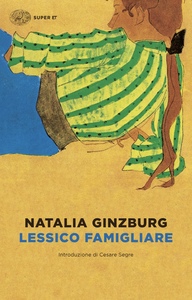Take a photo of a barcode or cover
funny
reflective
fast-paced

It's been interesting to read Natalia Ginzburg's memoir, Family Lexicon, immediately after her novel [b:All Our Yesterdays|71165|All Our Yesterdays|Natalia Ginzburg|https://i.gr-assets.com/images/S/compressed.photo.goodreads.com/books/1347305070l/71165._SY75_.jpg|68918] because of the similarities and the contrasts they offer.
The first half of All Our Yesterdays felt more like memoir than fiction because of the many members of two connected families who drifted in and out of the narrative, plus the many episodes that seemed important initially but which soon faded out just like in real life. The 'rules' of novel writing were openly ignored in that first half, those rules that warn against giving time to characters and events that will disappear from the story and which won't have any bearing on its outcome. However the second half of All Our Yesterdays, set in a different location, reads like fiction, and everyone and everything in it matters to the outcome.
The first half of Family Lexicon, set in the same time period as All Our Yesterdays, is full of the same true-to-life episodes with many characters drifting in and out in a similar way. Of course this makes sense because Family Lexicon is memoir, but the really strange thing is that instead of reading like real life, it reads like fiction! That's partly because of the child-like voice of the narrator and partly because everyone in her extended family seems larger than life and everything they do is dramatic, especially in the case of the father.
In fact the narrative is like a play at times: the characters enter from one side of the stage, stand under the spotlights for a moment, deliver their lines, often outrageous ones, then exit stage left. Sometimes two characters are on stage together, repeating lines we've heard before but somehow entertaining us nonetheless.
Repetition is something Natalia Ginzburg is fond of, and it works in this book because the first half of Family Lexicon is so faithful to its title: it is constructed around her family's lexicon, their favourite words and phrases, and it seems they were people who liked to repeat their lines over and over. I thought about that and realised that my own childhood was sprinkled with phrases that were repeated over and over too. 'Don't cry over spilt milk' was one I heard often, 'seek and you shall find' was another. It's enough for me to recall those phrases (no one around me says them anymore) to be transported back to childhood. Natalia Ginzburg describes that experience well. Speaking about meeting up with her siblings in later life, she says:
"All it takes is for one of us to say 'we haven't come to Bergamo on a military campaign' or 'sulfuric acid stinks of fart', and we immediately fall back into our old relationships, our childhood, our youth, all inextricably linked to those words and phrases. If my siblings and I were to find ourselves in a dark cave or among millions of people, just one of those phrases or words would immediately allow us to recognize each other. Those phrases are our Latin, the dictionary of our past, they're like Egyptian or Assyrian-Babylonian hieroglyphics, evidence of a vital core that has ceased to exist but that lives on in its texts, saved from the fury of the waters, the corrosion of time. Those phrases are the basis of our family unity and will persist as long as we are in the world..."
That paragraph is from the first half of the book but it resembles the more mature narrative voice of the second half of Family Lexicon which is straight-forward memoir and is in no danger of being confused with fiction. The switch to this more serious tone comes when Natalia Ginzburg first mentions 'a man named Ginzburg'. She will later mention in a very brief paragraph that at eighteen or nineteen or twenty (time is vague in this memoir) she married this man, and further on, in an equally brief paragraph, that he died in prison during WWII. She had several small children by that time.
Natalia Ginszburg spends a lot of time on detailed accounts of the doings of her parents, her brothers and sister, her aunts and uncles, her grandparents, other relatives and acquaintances, plus all their words and phrases, but when it comes to her husband, she gives us none of his words or phrases nor even much information about his life. Towards him, she remains perfectly private.
And the same goes for her second husband. He is mentioned only in passing though she lived with him for a long time. And it's interesting that she kept her first husband's surname name for the rest of her life. Most of the second half of the book concerns her work in two different publishing houses after the war, and the people she came across including the writer César Pavese.
Her family were also friendly with the artist Felice Casorati who painted the picture at the beginning of the review, and her brother Mario was briefly married to Jeanne Modigliani, daughter of the artists Jeanne Hebuterne and Amadeo Modigliani. Ginzburg said Jeanne M looked a lot like Modigliani's portraits of Jeanne Hebuterne:

And here's a photo of Natalia Ginzburg from the post war period.

emotional
funny
lighthearted
reflective
relaxing
sad
tense
slow-paced
funny
reflective
medium-paced
informative
reflective
medium-paced
funny
reflective
medium-paced
emotional
inspiring
fast-paced
non una recensione sul romanzo in sé - le parole si sprecano - ma durante tutta la lettura non ho potuto fare a meno di pensare al "mio" lessico famigliare e soprattutto il lessico legato alla nonnina; se nel caffè non c'è abbastanza zucchero, esclamo "amarum est"; se voglio rifiutare qualcosa, in automatico mi esce "manc si foss balsamo"; io e mamma in coro diciamo "okay Joe", la cui origine forse è del dopoguerra ma si è persa nei ricordi che, d'altronde, alla nonna dell'inglese se ne infischiava. E niente, ci penso <3






